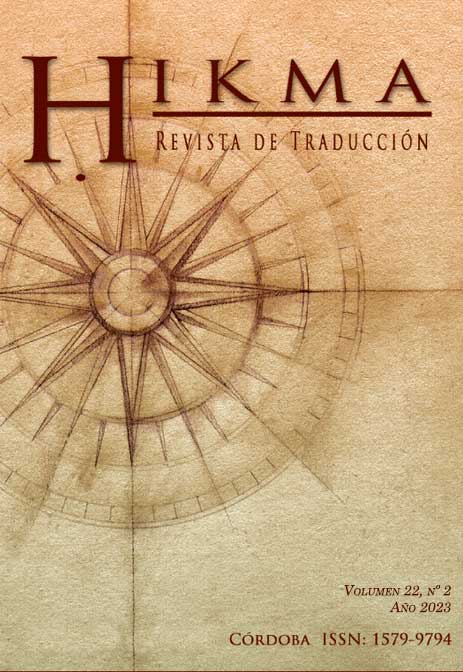Do students of Translation know and use enough lexicographic and terminographic resources? Results of an empirical study
Main Article Content
Abstract
Technological advances in the 21st century, especially artificial intelligence, are changing the way we document and obtain information. Translation has also been affected by these changes. However, now more than ever, it is worth highlighting the fundamental role of dictionaries in the translation process, as they provide quality conceptual and linguistic information that is difficult to be replaced. In this sense, it is essential to determine Translation students' knowledge of existing lexicographic and terminographic resources, and to investigate the use they make of them. Thus, this article studied the knowledge and utilisation of lexicographic and terminographic resources by 165 students of the four-year Degree in Translation and Interpreting and the Master's Degree in Professional Translation, at the University of Granada, by means of a questionnaire. Results reveal significant differences between the different academic years and, in general, a lack of knowledge and little use of terminographic resources, even by master’s students. Thus, this work highlights the need to include more training in the utilisation and typology of dictionaries in Translation studies.
Downloads
Article Details

This work is licensed under a Creative Commons Attribution-NonCommercial-ShareAlike 4.0 International License.
Authors who publish with this journal agree to the following terms:
1. Authors retain copyright and grant the journal right of first publication with the work simultaneously licensed under a Creative Commons Attribution License that allows others to share the work with an acknowledgement of the work's authorship and initial publication in this journal.
2. Authors are able to enter into separate, additional contractual arrangements for the non-exclusive distribution of the journal's published version of the work (e.g., post it to an institutional repository or publish it in a book), with an acknowledgement of its initial publication in this journal.
3. Authors are permitted and encouraged to post their work online (e.g., in institutional repositories or on their website) prior to and during the submission process, as it can lead to productive exchanges, as well as earlier and greater citation of published work (See The Effect of Open Access).
References
Altuwairesh, N. (2021). Translation trainee’s uses of and attitudes towards different types of dictionaries: a case study. International Journal of Applied Linguistics and English Literature, 10(2), 73-80. https://journals.aiac.org.au/index.php/IJALEL/article/view/6604 DOI: https://doi.org/10.7575/aiac.ijalel.v.10n.2p.73
Altuwairesh, N. (2022). Successful translation student’s use of dictionaries. International Journal of English Linguistics, 12(2), 25-35. https://doi.org/10.5539/ijel.v12n2p25 DOI: https://doi.org/10.5539/ijel.v12n2p25
Bergenholtz, H. y Tarp, S. (2010). LSP lexicography or terminography? The lexicographer’s point of view. En P. A. Fuertes-Olivera (Ed.), Specialized dictionaries for learners (pp. 27-37). De Gruyter. DOI: https://doi.org/10.1515/9783110231335.1.27
Bowker, L. (2010). The contribution of corpus linguistics to the development of specialised dictionaries for learners. En P. A. Fuertes-Olivera (Ed.), Specialized dictionaries for learners (pp. 155-168). De Gruyter. DOI: https://doi.org/10.1515/9783110231335.2.155
Camacho Niño, J. (2013). La lexicografía en los planes de estudio de traducción e interpretación en España. Hikma, 12, 47-63. https://doi.org/10.21071/hikma.v12i.5235 DOI: https://doi.org/10.21071/hikma.v12i.5235
Gavriilidou, Z. (2014). Users’ abilities and performance in dictionary look up. En N. Lavidas, T. Alexiou y A. M. Sougari (Eds.), Major trends in theoretical and applied linguistics (pp. 41-52). De Gruyter. https://doi.org/10.2478/9788376560885.p13 DOI: https://doi.org/10.2478/9788376560885.p13
Gromann, D. y Schnitzer, J. (2015). Where do business students turn for help? An empirical study on dictionary use inn foreign-language learning. International Journal of Lexicography, 29(1), 55-99. https://doi.org/10.1093/ijl/ecv027 DOI: https://doi.org/10.1093/ijl/ecv027
Hamouda, A. (2013). A study of dictionary use by Saudi EFL students at Qassim University. Studies in English Language Teaching, 1(1), 227-257. https://doi.org/10.22158/selt.v1n1p227 DOI: https://doi.org/10.22158/selt.v1n1p227
Hausmann, F. J. (1989). Wörterbuchtypologie. En F. J. Hausmann, O. Reichmann, H. E. Wiegand y L. Zgusta (Eds.), Dictionaries. An international encyclopedia of lexicography 1 (pp. 968-981). De Gruyter.
Karami, S. y Riasati, M. J. (2023). A study of electronic dictionary use and attitudes among Iranian students of translation during Covid-19 pandemic. Education Research International, 1-9. https://doi.org/10.1155/2023/7616256 DOI: https://doi.org/10.1155/2023/7616256
Kodura, M. (2016). Dictionary-using skills of translation students. The Central European Journal of Social Sciences and Humanities, 4, 235-242.
Kosem, I. et al. (2019). The image of the monolingual dictionary across Europe. Results of the European Survey of Dictionary use and Culture, International Journal of Lexicography, 32(1), 92-114. https://doi.org/10.1093/ijl/ecy022 DOI: https://doi.org/10.1093/ijl/ecz002
L’Homme, M. C. y Leroyer, P. (2009). Combining the semantics of collocations with situation-driven search paths in specialized dictionaries. Terminology, 15(2), 258-283. https://doi.org/10.1075/term.15.2.05lho DOI: https://doi.org/10.1075/term.15.2.05lho
Lew, R. y De Schryver, G. M. (2014). Dictionary users in the digital revolution. International Journal of. Lexicography, 27(4), 341-359. https://doi.org/10.1093/ijl/ecu011 DOI: https://doi.org/10.1093/ijl/ecu011
Lew, R. y Szarowska, A. (2017). Evaluating online bilingual dictionaries: The case of popular free English-Polish dictionaries. ReCALL, 29(2), 138-159. https://doi.org/10.1017/S0958344016000252 DOI: https://doi.org/10.1017/S0958344016000252
Maldonado González, M. C. y Liébana González, M. (2021). Los motores de traducción automática y su uso como herramienta lexicográfica en la traducción de unidades léxicas aisladas. Círculo de Lingüística Aplicada a la Comunicación, 88, 189-211. https://dx.doi.org/10.5209/clac.77002 DOI: https://doi.org/10.5209/clac.77002
Márkus, K. P., Fajt, B. y Dringó-Horváth, I. (2023). Dictionary skills in teaching English and German as a foreign language in Hungary: a questionnaire study. International Journal of Lexicography, 36(2), 173-194. https://doi.org/10.1093/ijl/ecad004 DOI: https://doi.org/10.1093/ijl/ecad004
Pérez Hernández, M. C. (2002). Explotación de los córpora textuales informatizados para la creación de bases de datos terminológicas basadas en el conocimiento [Tesis doctoral]. Universidad de Málaga. http://elies.rediris.es/elies18
Sánchez-Ramos, M. M. (2005). Research on dictionary use by trainee translators. Translator Journal 9(2). https://translationjournal.net/journal/32dictuse.htm
Svike, S. (2022). Survey analysis of dictionary-using skills and habits among translation students. En A. Klosa-Kückelhaus, S. Engelberg, C. Möhrs y P. Storjohann (Eds.), Dictionaries and Society. Proceedings of the XX EURALEX International Congress (pp. 494-508). IDS-Verlag. https://euralex.org/wp-content/uploads/2022/09/EURALEX2022_Proceedings.pdf
Sycz-Opoń, J. (2019) Information-seeking behaviour of translation students at the University of Silesia during legal translation – an empirical investigation, The Interpreter and Translator Trainer, 13(2), 152-176. https://doi.org/10.1080/1750399X.2019.1565076 DOI: https://doi.org/10.1080/1750399X.2019.1565076

